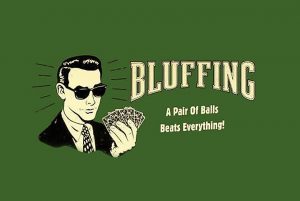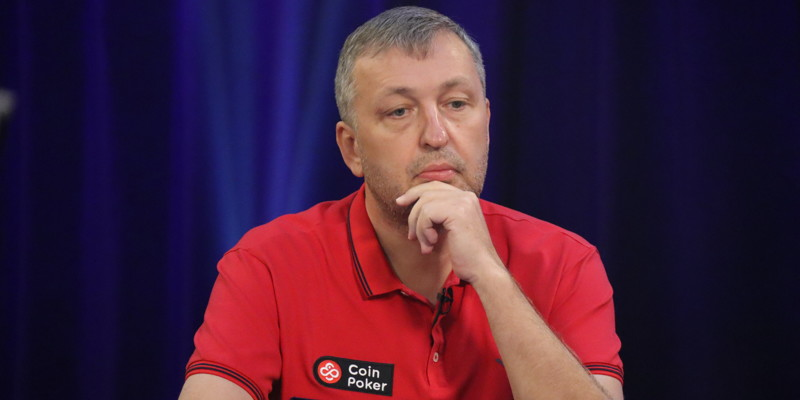iPoker review 2024
iPoker Network Review The iPoker network consists of numerous sites like Bet365, William Hill, Titan Poker, and Betfair, each offering a unique experience. While they…
As in almost any other game, poker also has strategies and tactics. Why is poker strategy important? It allows the player to make the most beneficial decisions in a wide variety of situations. Poker strategies for beginners and advanced players. Poker secrets. Here you will find various useful information about tactics, software, online poker rooms, and more.
iPoker Network Review The iPoker network consists of numerous sites like Bet365, William Hill, Titan Poker, and Betfair, each offering a unique experience. While they…
What is CoinPoker? CoinPoker is a poker platform that operates with cryptocurrency and is based on blockchain technology. It is known for being the first…
Without a doubt, the most popular type of online poker is Texas holdem poker online. People particularly enjoy the two-handed Holdem game variation. This time,…
Phil Hellmuth, due to his fiery and very provocative playing style, is an American personality that attracts extremely opposite reactions. To some, he is a…
GTO Solvers programs operate using various mathematical functions and performing numerous analytical actions during each move. In layman's terms, we can call these programs super…
Based on poker earnings, D.Negreanu is the third player in the world. He is a two-time WSOP Player of the Year, once won the WPT…
First of all – you can't calculate everything No matter how powerful a computer or formulas you have, it is simply impossible to create an…
You can try playing poker for free on more than one platform. Let's name the most popular ones. It should be noted that free poker…
One of the fastest and most effective ways to improve and achieve better results is by using poker software. Programs like Simple GTO Trainer or…
Since there are several different types of poker games, the gameplay itself is very dynamic, making it quite challenging to discuss strategies.
We will try to review the basic rules of poker strategies.
One of the most famous poker minds of all time, David Sklansky, created the fundamental poker theorem. Many derivative strategies at the poker table are based on it.
The essence of the fundamental poker theorem is the advantage that can be gained at the table in only two ways:
The engines of the theorem, and thus all strategies, are bluffing, slow-playing and other similar actions.
In poker, it’s important to know how to hide emotions and not reveal the strength or weakness of your hand through your behavior. The rules of the game allow for deception and tricks to mislead your opponents and make them act differently than they would if they saw your cards.
Bluffing is a way of playing where a player, without a strong combination and not necessarily having a chance to get a good combination during the game, makes bets and takes other actions to mislead opponents. The goal is to make opponents believe you have a strong hand. This strategic maneuver can be effective if used properly.
If there is a high probability of forming a good combination in later rounds (e.g., straight, flush etc.), but it is not yet achieved – bluffing at this time is called semi-bluffing. Bluffing involves betting a lot, trying to draw attention to yourself.

Slow-play is another way of playing. It is a deceptive tactic that is the complete opposite of bluffing.
A player who slow-plays bets little, acts sluggishly, often checks or looks at their cards, and tries to get other players at the table with weaker hands to raise the stakes and increase the prize pool.
These two ways of playing are the cornerstone of every poker strategy. Simply doing everything as it is – is not worthwhile, as other players will know what you are doing.
You need to gain an advantage, and cunning is used for that. Well, when, where, how, and how much of those advantage-giving deceptions to use – is the individual spice of each strategy.
Since roles change during a poker game (Big-blind, small-blind, etc.), there are consequences affecting strategy that need to be known.
Essentially, players who have to act first must act more decisively, betting larger amounts than those who will act later.
It is important to understand the advantages and weaknesses of each position, as understanding position is one of the most crucial elements that allow players to be profitable in the long run.
If you are in a position that forces you to act later, you can better analyze what cards your opponents potentially have. And if you need to act immediately, you can see how others react to your bets.
Poker is a game where successful players always have a strategy. If you are preparing to call a bet or raise, there must be a valid reason for these moves. Making a bet without reason or thought is simply not beneficial.
 Want to manipulate the winning probability (pot odds) – by calling a bet instead of raising it, you always increase the benefit for players who act later to call the bet instead of raising it. So even if you have a strong hand, by just calling the bet, you can push a weak player to call even with a weak combination (overcall) or even raise the bet – shifting the advantage to your hands.
Want to manipulate the winning probability (pot odds) – by calling a bet instead of raising it, you always increase the benefit for players who act later to call the bet instead of raising it. So even if you have a strong hand, by just calling the bet, you can push a weak player to call even with a weak combination (overcall) or even raise the bet – shifting the advantage to your hands.Of course, there are other reasons why it’s worth and possible to make a call or raise, but we have covered the main ones.
You might be interested to know what strategy the most famous and successful players use at the poker table? We have a few examples for you.
Daniel Negreanu – he aims to create the image of a very active player and wants to constantly tease and provoke his opponents with the same activity. Trying to win all the small pots and playing even with a fairly low probability of winning, D. Negreanu quite often takes the prize pool even in the pre-flop stage when he raises the bet. This way, he doesn’t risk too much and increases his chances of winning. This is called small-ball poker.
Phil Ivey – this man once won 16.6 million US dollars in one day, so his strategy is definitely worth attention. Phil Ivey constantly tries to intimidate his opponents and make them doubt their decisions and worry. P. Ivey stares at them, constantly looks around, and acts methodically. He tries to play unpredictably and never plays the same way, and he doesn’t shy away from bluffing.
Tony G – the most famous Lithuanian ever to sit at a poker table, Antanas Guoga plays aggressively, deceptively, and strongly. If an opponent makes a mistake, Tony G will definitely tease them about it. By talking a lot, constantly provoking his opponents, and acting unpredictably, the Lithuanian can disrupt other players’ ability to make rational decisions, causing them to make mistakes.

Phil Hellmuth Jr.– probably the poker player most similar to Tony G. P. Hellmuth yells a lot, complains, talks, and doesn’t shy away from showing his ego.
Many consider him the most self-important and egotistical player, but we cannot deny that he is very successful. It could be said that he manages to distract other players and thus force them to make mistakes, but P. Hellmuth Jr. himself reads situations very well and can act excellently at the table where many different players sit.
Justin Bonomo– he is a true student, learner, and methodologist. As he talks about his achievements, Justin Bonomo devotes an incredible amount of time and attention to studying his opponents’ game histories.
He always more or less knows who he will sit at the table with and how they like to act. Because of this, he maintains quite good chances of winning any table.
Bryn Kenney– probably the most successful poker player in recent years. His strength is bluff analysis. Bryn Kenney not only finds ideal opportunities for bluffs but also almost instantly understands when his opponents are bluffing.
Playing quite dynamically and never entering strong confrontation without a plan B, this poker professional has achieved very impressive results.
First of all, you should constantly learn and deepen your knowledge and improve your understanding of the game, increasing your experience. However, there are also certain specific decisions and steps you can take to increase your earnings at the poker table.
Your next step should be choosing the right software.
Poker support programs are an essential attribute of a successful player. It is simply physically impossible to process and collect data in such quantities as any program does.
PokerTracker 4 and Holdem Manager 3 are probably the best choices for beginners who constantly accompany their game. With these tools, you significantly increase your competitiveness at any table. There are also programs for more advanced players, but only those who are very experienced and look for every possible nuance and detail to turn to their advantage can fully utilize their capabilities.
You will find the best strategy for yourself only when you have enough experience playing at the table to know your strengths and weaknesses. Only by knowing these nuances can you start looking for a strategy that will be effective.
There is no one right option for every player. We have already described the most successful players from around the world. Have you seen? Almost all of their strategies are incredibly different and dissimilar to each other, yet they are all successful.
Play, gain experience, and you will quickly find the best game strategy for yourself.